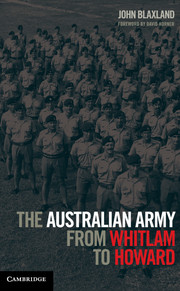Book contents
- Frontmatter
- Foreword
- Contents
- Photographs
- Acknowledgements
- Abbreviations
- Maps
- Introduction
- Part 1
- Part 2
- Chapter 3 East Timor, 1999–2000
- Chapter 4 Operations with the UN in East Timor, 2000–04
- Chapter 5 Operations in Solomon Islands from 2000
- Chapter 6 Operation Astute in Timor-Leste, 2006 and beyond
- Part 3
- Part 4
- Conclusion
- Appendix
- Notes
- Bibliography
- Index
Chapter 6 - Operation Astute in Timor-Leste, 2006 and beyond
from Part 2
Published online by Cambridge University Press: 05 February 2015
- Frontmatter
- Foreword
- Contents
- Photographs
- Acknowledgements
- Abbreviations
- Maps
- Introduction
- Part 1
- Part 2
- Chapter 3 East Timor, 1999–2000
- Chapter 4 Operations with the UN in East Timor, 2000–04
- Chapter 5 Operations in Solomon Islands from 2000
- Chapter 6 Operation Astute in Timor-Leste, 2006 and beyond
- Part 3
- Part 4
- Conclusion
- Appendix
- Notes
- Bibliography
- Index
Summary
Nearly two years after the withdrawal of the last Australian battalion group from East Timor (or ‘Timor-Leste’ in Portuguese) under the UN mandate, the security situation deteriorated dramatically following the sacking of several hundred soldiers from the East Timorese Army: part of the Falintil – East Timor Defence Force (known by its Portuguese acronym, F-FDTL). The factors leading to the outbreak of violence pointed to what in hindsight was a premature departure two years earlier. Yet despite years of experience of working in the newly independent country, the ADF and the Australian Government found themselves with little understanding of what prompted the return of international security forces. Nevertheless the Army recognised its role as part of an inter-agency approach to a complicated incident and sought to come to grips with the opaque internecine disputes that led to the breakdown in law and order. Noting its complexity, the ADF, with the Army prominent, remained the government's force of first resort to insert into the chaos in Dili in mid-May 2006. ADF units were pre-positioned for a rapid response as law and order broke down. Elements of the Australian Army were once again tasked to deploy at short notice to Dili as the main part of an international force assembled for Operation Astute.
The Australian deployment to East Timor followed the receipt of a formal request for military assistance to the Australian Government late on 24 May. Prime Minister Howard approved it immediately, and the VCDF, Lieutenant General Ken Gillespie, travelled to Timor-Leste the next day to negotiate the terms and conditions of the deployment. The ADF's mission was ‘to assist the Government of Timor-Leste to facilitate the evacuation of Australian and other foreign nationals as is appropriate and necessary; stabilise the situation and facilitate the concentration of the various conflicting groups into safe and secure locations; and create a secure environment for the conduct of a successful dialogue to resolve the current crisis’. Brigadier (later Major General) Michael Slater, Commander 3rd Brigade, was appointed commander of all Australian forces in Timor-Leste.
- Type
- Chapter
- Information
- The Australian Army from Whitlam to Howard , pp. 198 - 208Publisher: Cambridge University PressPrint publication year: 2013



